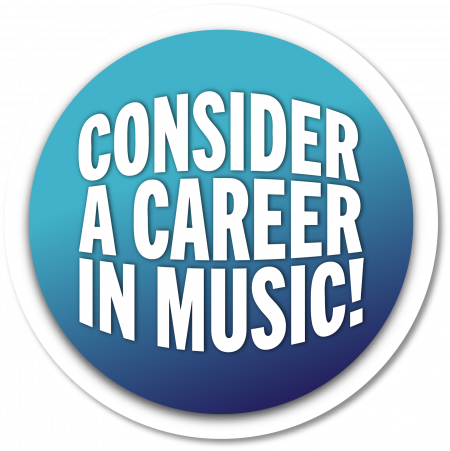
Careers in Music

Why Choose a Career in Music?
A career in music includes hundreds of viable choices in addition to the traditional performer and teacher pathways. Music and the creative industries—including pro-audio, event technology, and more—are dynamic and constantly expanding. Individuals with creativity, technical skills and curiosity, organizational skills, teamwork, and a passion for music are highly sought after.
Variety
The creative industry is perpetually evolving with hundreds of exciting and rewarding career opportunities and professional communities.
Community
The music industry is made up of creative, collaborative, and generous professionals eager to welcome passionate individuals into the global music community.
Purpose
Music has a profound and positive effect on the world. A life in music is a life with purpose.
Stability
The music industry holds hundreds of options for a sustainable life in music, and the demand for skilled employees is extremely high.
Sustainability
Music careers provide significant financial stability. The median annual income falls between $49,000 and $79,000. However, those in leadership positions can command salaries exceeding $230,000.
Paths to Consider
Numerous pathways exist for pursuing a career in music, and the path you choose will depend on your interests, skills, motivations, and objectives. Although there is no universal route to a career in music, here are several common pathways to consider:

Formal Education
Pursue a degree in music—whether it's a major, minor, or a two-year degree—from a conservatory, college, university, or through a professional training program. Degree options include music teaching, performance, arranging, composition, music business, pro audio, and technology.

Internships
Work as an intern at a music company or organization while pursuing higher education. Internships provide valuable insights into a company's products, culture, and administrative processes. They offer an opportunity to network with professionals at various stages of their careers and to explore potential career paths.

Apprenticeships
Seek an apprenticeship in the music industry, particularly for roles that require specialized technical skills such as instrument building, stagecraft, or event support. Apprenticeships typically offer paid, on-the-job training under the guidance of experienced professionals.

Private Lessons/Self-Study
Take private lessons with a skilled music teacher. This pathway provides personalized instruction tailored to specific needs. New and evolving technologies provide a multitude of self-study options. Continuous learning and self-improvement are key themes for every music career.

Entrepreneurship
Develop entrepreneurial skills to create your own opportunities within the music industry. Consider starting a music teaching business, developing a product or service, establishing a record label, or organizing concerts. Harnessing your creative energy to innovate and explore new avenues for making music can drive these endeavors forward.

Networking
Attend events like The NAMM Show and state music conferences to meet industry professionals and fellow musicians, and explore job prospects. Networking is vital in the music industry for developing ideas, enhancing skills, and expanding career opportunities.
Toolkit & Materials
The NAMM Foundation, in partnership with the National Federation of State High School Associations (NFHS), and the Teach Music Coalition, has created helpful materials highlighting the many career opportunities in the music industry. Download yours below...
*Note: When ordering printed brochures for the first time you will need to create a free user account. After logging in, select "Brochures" from the category list, and then select the "Careers in Music" brochure. Click on the quantity field and select the amount you want to order. Add your selection to the cart and proceed through the checkout process. You will not be asked to enter payment information; the NAMM Foundation will cover any shipping costs displayed.
TOOLKIT HIGHLIGHTS

Next Steps
For those eager to explore or encourage a career in music, we recommend taking the following steps:

For Students
Share your career interests and aspirations with parents, teachers, and school counselors using the brochure as a reference. Talk to people who currently work in the music industry at events like educator conferences or The NAMM Show to meet professionals in occupations you're interested in.

For Parents and Guardians
Talk to your high schooler about future career goals and how they align with opportunities in the music industry. Use the resources offered to start a conversation with educators and school counselors about establishing the pathways and skills needed for a career in music.

For Music Teachers and Educators
Review the Consider a Career in Music brochure with students, parents, and school counselors. Share experiences in pursuing a career in music and, where possible, serve as a resource for students considering a profession in music and the creative sector.

For School Counselors
Provide brochures and discuss the options for a life in music with your students and their parents. Collaborate with music education and industry professionals in your district, school or community, and explore the many career opportunities that exist.

For Employers & NAMM Members
Share the brochures with educators and school counselors in your area. Offer the brochures at your point of sale, in your lesson studios, or at your back-to-school rental presentations. Share your own career story with students interested in a life in music.

Know the Landscape
Stay informed with regular updates on Federal and State workforce development policies and programs. Workforce development agencies work to build and fortify the training-to-career pipeline.
Visit NAMM.org to review policy issues that impact the music industry.
Additional Resources
NAMM Oral History Library - Careers in Music – Thousands of video interviews with industry professionals
National Federation of State High School Associations – Music career resources
Teach Music – Music education career resources
Berklee College of Music – Career communities, paths, industries, resources, and programs
U.S. Bureau of Labor and Statistics – Information about hundreds of occupations in the U.S.
National Federation of State High School Associations – Music career resources and educator lesson plans
